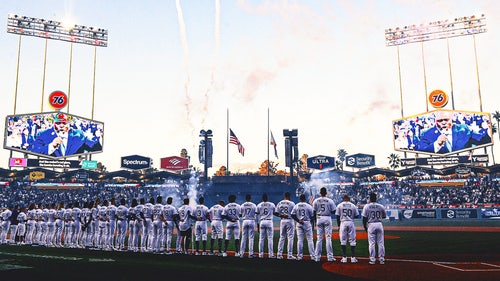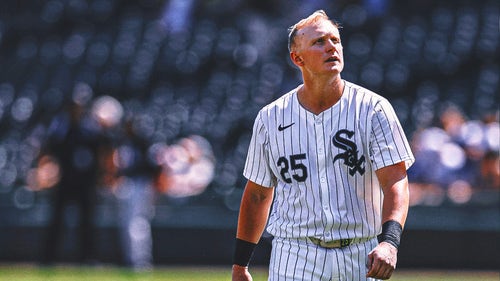
The inevitable variance of postseason baseball
Clayton Kershaw gave up eight runs in his last start. Mike Trout went 1-for-12. After a pair of sweeps against formidable teams, the ALCS is set as Royals-Orioles. Up is down, black is white, war is peace.
It feels like this year's postseason has catapulted us into a bizarre world of sabermetric inversion, in which everything we thought we knew about the teams, players, and managers is wrong. The two teams which played perhaps the best baseball of anyone in the regular season (by run differential and win-loss record respectively), the Oakland A's and Los Angeles Angels, were defeated by a series of strange strategic decisions ordered by one of baseball's least saber-savvy managers. The mighty Tigers have been swept by a team no one predicted would even make the postseason, much less advance within it.
It is in terms of individual players that we see the greatest and most startling reversal of fortune. Trout, the likely AL MVP, had his powerful bat silenced (except for a solo homer) by a Royals team intent on challenging his only real weakness: the high fastball. Meanwhile, in the senior circuit, Kershaw, the likely NL MVP (if not for anti-pitcher bias), saved the worst start of his year for the most important moment in the season to date.
In this new world of opposites, two of the best players are now, inexplicably, playing like two of the worst. At this point it can be tempting to ascribe the changes to some unknown causes. Maybe somehow the Royals figured out a secret about baseball tactics that nobody else understood: the trick to turn Trout into a replacement-level player (despite other teams approaching him in the second half in a similar fashion). Maybe Kershaw was tipping his pitches somehow, although the evidence is equivocal. Perhaps both players let the thrill of the moment get to them somehow.
It's not that those factors couldn't be contributing, but the truth is that we don't need them to explain the outcome of these games. The simple fact of the matter is that good players and good teams perform poorly, once in a while. Trout has more than a dozen hitless games on the season. Kershaw's implosion was a little rarer; you have to go back to May 17 to find a Kershaw start as bad as the one he had. Still, the point remains: bad games happen to even the best players.
You can get an idea of how much variance there is in the game of baseball by playing around with a baseball simulator (such as Matt Hunter's). A simulator takes the observed statistics of a set of players, and goes through a series of games involving those players, modelling and recording the outcome of each plate appearance. Simulators can be of arbitrary complexity, but for our purposes, something simple will do.
To get an idea of how variable baseball can be, we can take two teams of different strength and see how often the worse team wins. So, for example, the Nationals were World Series favorites (according to Vegas) before the playoffs began, while the Pirates had the second-lowest odds (and were defeated soundly in the play-in game). In a simplified game started by Jordan Zimmermann and Edinson Volquez, and replayed 1,000 times, the Nationals would win 60 percent of the time, according to the simulator.
Conversely, that means that the Pirates, despite being vastly inferior (at least inside the bounds of the simulator), would win 40 percent of the single games. Extrapolating out to a five-game series, despite the Dodgers' obvious superiority, the Pirates would win about a third of the time. The longer the series, the less likely the Pirates are to be the victor, but even at seven games, the probability of a Pirates series win is still 30 percent.
The simulator shows that the results of any series are subject to significant amounts of luck. No matter the imbalance between teams, the worse team can always squeeze out a series win on occasion. Between (arguably) the worst and best teams in the playoffs, the lesser team will still advance about one in every six tries.
But it's not just relatively evenly matched teams like the Dodgers and Pirates which are subject to luck. We can go a step further and create an uber-team, observing the extent to which even its performance varies game by game. If the best team we can imagine gets beaten from time to time, that suggests that the far more evenly matched series we see are also likely to be dominated by luck.
What better place to start with our uber-team than Trout and Kershaw, twin MVP candidates? Kershaw will take pitching duties, and of course pitch a complete game each outing. For position players, we can clone Trout nine times over. Never mind the fact that Trout might not make a great catcher -- defense isn't in the simulator anyway. A team of hitters slugging as well as Trout has this year, and getting the run prevention Kershaw affords, should be invincible. Our patsy, against whom Team MVP will battle, can be the Royals, who started the postseason with the lowest odds of winning the World Series.
Against the clone army of Trouts and Kershaws, the Royals score a pitiful runs per game average of 2.12, a full run below the worst hitting team in baseball this year (the Padres). None of their hitters manages to muster an OBP above .282; their highest OPS is merely .634. On the other side of the ball, the Trout clones ravage the Royals to OPSs which vary from .819 to .849. The lineup mangles Ventura, the Royals' designated sacrifice, to the tune of 5.6 runs per game, easily exceeding the highest margin in the league this year.
Yet, despite the utter domination of team MVP in the box score, they win a mere 83 percent of the time. This bears repeating: one time in every six tries, the hopelessly outmatched (simulated) Royals manage to squeeze out a win against the dominance of nine Trouts and one Kershaw. Over the course of a five-game series, the Royals would win about once in ten tries. This suggests that no combination of players is sufficient to guarantee a playoff victory. The most lopsided matchups we can imagine will still produce an occasional victory for the underdog.
That doesn't take anything away from the underdog, mind you. The Royals are playing legitimately great baseball, and their wins are well-deserved, if surprising. Billy Butler still stole second; no matter how improbable that event is, it happened (and was amazing to watch).
If anything, note that the simulator is making things more deterministic than they really are. In real baseball, one doesn't get to start one's ace 100 percent of the time, and the messiness of bullpens can creep in, as the Tigers have recently re-discovered. Players change and adjust to each other, and in any case, the simulator can't consider every aspect involved in the game. All of these factors tend to make the role of luck more pronounced, not less. I use the simulator here only to illustrate just how much of a role variance plays in the game.
It's a lesson which bears repeating because every year, the regular season lures us into a false sense that we understand and can predict baseball. Baseball's season is easily the longest of any major sport, and over 162 games lots of variance evens out and we are left with reasonably accurate measurements of how good players are. We can even see players improve or decline or change as the season progresses.
But then the postseason hits, jarring and irregular, beginning now with a one-game do-or-die trial. The samples we were used to on the scale of hundreds of plate appearances or thousands of pitches are shrunk down to dozens or hundreds of each. The game changes because the teams playing in the postseason are more like each other in terms of talent and coaching than the whole of MLB. The wide variety of player and team-strengths earlier in the season contracts so that we have basically a handful of near-coin-flip games. There are no Team MVP matchups, only a succession of great teams with minor flaws here and there. Anybody can win against anybody, especially over the course of one, five, or seven games.
As a consequence, randomness reigns, variance is magnified, and entropy asserts its dominance, even over the likes of Trout and Kershaw. The kings of the regular season are made anonymous by luck, and conversely, the extras who fill postseason rosters can be elevated, with a few well-placed pitches or hacks, to the status of heroes. Everything old is rendered new again, at the cost of our having any idea what will happen or how.










